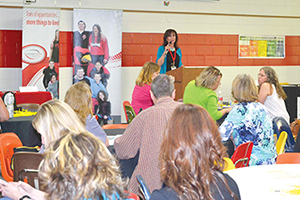By BETSY TAYLOR
Two Hospital Sisters Health System medical centers in western Wisconsin are leading a multiyear effort to educate thousands of people about mental illness and suicide prevention. A need for better education and resources related to mental health has been a concern in the region for years. That was underscored when mental health was identified as the top issue in a 2015 community health needs assessment.

Hospital Sisters Health System's Rhonda Brown instructs at a summit on the mental health of teens held in western Wisconsin in June of 2017. Two of the system's hospitals in the area have taught more than 6,000 community members to recognize warning signs of suicide and to provide support for mentally ill individuals in crisis.
In 2015, the two counties where the hospitals are located each had the highest number of suicides in recent years. HSHS St. Joseph's Hospital in Chippewa Falls is located in Chippewa County, where there were 16 recorded suicides in a population of about 63,500 residents in 2015; HSHS Sacred Heart Hospital in Eau Claire is in Eau Claire County, where 22 suicides were recorded in the county of 102,000 residents in 2015.
Late in 2014 the hospitals began ramping up suicide prevention and mental health education in their communities. Fewer people died by suicide in the two counties in 2017, with 10 in Chippewa County and 16 in Eau Claire County. Health educators say they can't say their work contributed to the decline. Anecdotally, they have heard from participants in their educational offerings who say they've referred people in crisis to mental health assistance as a result of taking classes.
In western Wisconsin, five trainers at the two Hospital Sisters Health System medical centers, located 12 miles apart, have been teaching a model used elsewhere in the nation called QPR. That stands for question, persuade, refer. Its 90-minute curriculum includes education about warning signs that someone may be suicidal, ways to communicate with that person, and how to refer the individual for help.
Fifty-four people have taken "train the trainer" classes offered in the counties, to expand the program's reach. Through early 2018, more than 6,350 people had completed QPR training, said Laura Baalrud, a community health educator for HSHS in western Wisconsin.
Many who took the QPR training wanted to learn more about mental health interventions. In 2016, two of the trainers began teaching Mental Health First Aid, a curriculum that started in Australia and is taught throughout the U.S. Participants learn to identify, understand and respond to signs of the most common mental health illnesses and substance abuse disorders. Baalrud said it gives actionable "if you're worried about someone, here's what you need to do" information. More than 580 Eau Claire and Chippewa County community members have completed the free eight-hour course.
Breaking the silence
"Our thought was to get the conversation started, for one thing, because mental health and suicide prevention are not things people talk about very easily. We wanted people to start to be comfortable talking about mental health the way they are comfortable talking about physical health," said Rhonda Brown, director of 3D Community Health: Body. Mind. Spirit and The Healing Place, Sacred Heart and St. Joseph's hospitals, HSHS Western Wisconsin Division. 3D Community Health is a service of the two hospitals that collaborates with Chippewa and Eau Claire counties to assess top health concerns and develop plans to address them.
Having members of the general public attuned to signs of suicidality improves the chances that a person in crisis may be directed to effective intervention, Brown said.
The core ideas of the QPR Institute, the national organization that launched the suicide prevention training program, include:
- Early detection and treatment results in better outcomes. Recognizing "early the warning signs of suicide, opening a supportive dialogue with a suicidal person and securing consultation with a professional may prevent the need for an emergency room visit or psychiatric hospitalization," according to the institute. Warning signs of suicidal ideation include expressions of hopelessness, depression, giving away prized possessions, talking of suicide and securing lethal means.
- Asking someone about the presence of suicidal thoughts and feelings opens a conversation that may lead to a referral for help.
- Referral to local resources or calling 1-800-Suicide for evaluation and possible referral is critical.
Counseling and support
Brown said, as part of the mental health education sessions, trainers spread the word that the hospitals offer free, therapeutic response through various support groups. Those sessions are offered through The Healing Place, a community outreach service of HSHS Sacred Heart Hospital. Brown oversees The Healing Place and said it is funded through the hospital's budget, two related foundations and grants.
The health care system also brings in nationally known speakers to talk to the public about mental health and offers mental wellness classes.
One woman who took part in QPR's train the trainer classes emailed her instructor sharing that she had attempted suicide in 1993. She said she grew up in an unhealthy family, and that her parents had not sought help for themselves or their children. "We needed so much help but the whole neighborhood we lived in were lost souls. Alcohol and drug abuse were in every house … and even worse than that," the woman wrote.
She said that taking part in the QPR instructor training brought her healing and that she looked forward to educating others in the community. "All I want to see is for people to be well, individually and within their family. … This is not an easy road for anyone … but a road worth walking together."
Copyright © 2018 by the Catholic Health Association
of the United States
For reprint permission, contact Betty Crosby or call (314) 253-3490.